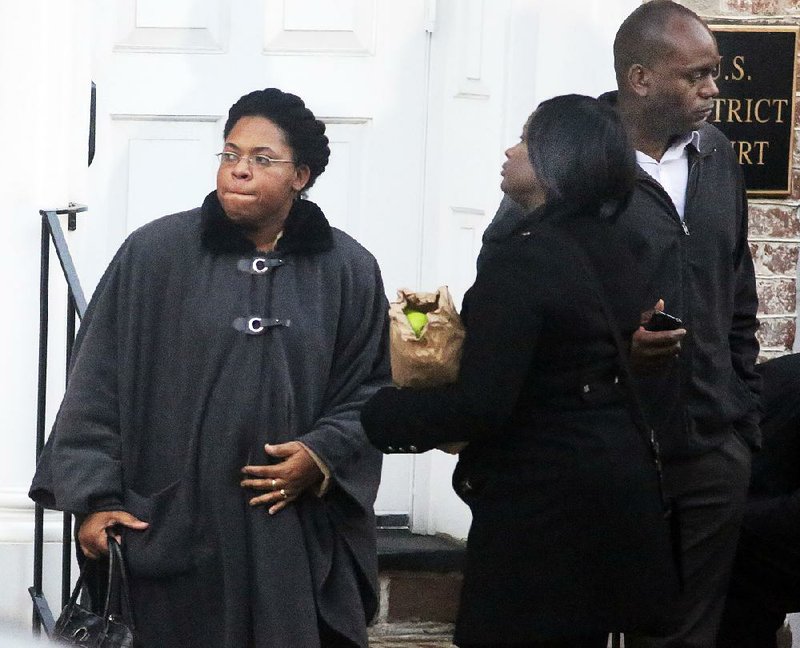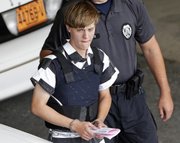CHARLESTON, S.C. -- Dylann Roof was sentenced to death Tuesday for killing nine black church members during Bible study, the first person to face execution for federal hate-crime convictions.
A jury deliberated on his sentence for about three hours, capping a trial in which Roof did not fight for his life or show any remorse. He was his own attorney during sentencing and insisted that he wasn't mentally ill, but he never asked for forgiveness or mercy, or explained the crime.
And he threw away one last chance to plead for his life on Tuesday in his closing argument.
"I told them [the FBI] I had to do it," he said. "Obviously that's not true. Nobody made me do it. I felt like I had to do it, and I still feel like I had to do it."
"Anyone that thinks I'm filled with hatred has no idea what real hatred is," said Roof, a self-described white supremacist who has said he hoped his high-profile killings would incite a race war in America. "They don't know anything about me. They don't know what real hatred looks like. They think they do, but they don't.
"I would say that in this case, the prosecution and anyone else who hates me, are the ones that have been misled," he continued. "Wouldn't it be fair to say that the prosecution hates me?"
"I have the right to ask you to give me a life sentence, but I'm not sure what good it would do anyway," he said.
Each juror looked directly at Roof, 22, as he spoke for about five minutes. A few nodded as he reminded them that they said during jury selection that they could fairly weigh the factors of his case. Only one of them, he noted, had to disagree to spare his life.
With that, Roof paused, looked up and said:
"That's all, thank you."
When the verdict was read hours later, he stood stoic and showed no emotion. Several family members of victims wiped away quiet tears.
Unity in tragedy
Malcolm Graham, whose sister Cynthia Hurd was slain, said he thought the jury made the right decision.
"There is no room in America's smallest jail cell for hatred, racism and discrimination," he said from his home in Charlotte, N.C. "The journey for me and my family today has come to an end."
Roof told FBI agents when they arrested him after the June 17, 2015, slayings that he wanted the shootings to bring back segregation or perhaps start a race war. Instead, the slayings had a unifying effect, as South Carolina removed the Confederate flag from its Statehouse for the first time in more than 50 years and other states followed suit, taking down Confederate banners and monuments. Roof had posed with the flag in photos.
Roof specifically picked out Emanuel African Methodist Episcopal Church, the South's oldest church with a historically black congregation, to carry out the cold, calculated slaughter, Assistant U.S. Attorney Jay Richardson said.
Richardson told the jury how Roof had planned the shootings for months and had become radicalized into racial hatred online in recent years -- especially since the killing of black Florida teenager Trayvon Martin by George Zimmerman.
"He feels no remorse because it was worth it to him," Richardson said.
The 12 people he targeted opened the door for a stranger with a smile, he said. Three people survived the attack.
"They welcomed a 13th person that night ... with a kind word, a Bible, a handout and a chair," Richardson said during his closing argument. "He had come with a hateful heart and a Glock .45."
The gunman sat with the Bible-study group for about 45 minutes. During the final prayer -- when everyone's eyes were closed -- he started firing. He stood over some of the fallen victims, shooting them again as they lay on the floor, Richardson said.
Richardson displayed photos of all nine victims, who ranged in age from 26 to 87 -- contrasting photos of them smiling in life and lying crumpled and bloody on a church basement floor after being shot by Roof.
Richardson also noted that Roof considered Adolf Hitler "an icon, someone to be emulated," and even loaded 88 bullets into his gun's magazines -- a common white supremacist symbol: H is the eighth letter of the alphabet, and 88 represents "Heil Hitler."
Richardson urged the jury to "speak the truth and hold this defendant accountable for his actions. Sentence this defendant to death."
Victims remembered
Nearly two dozen friends and relatives of the victims testified during the sentencing phase of the trial. They shared cherished memories and talked about a future without a mother, father, sister or brother. They shed tears, and their voices shook, but none of them said whether Roof should face the death penalty.
Jennifer Pinckney testified about huddling under a desk with her 6-year-old daughter, her hand clasped over the girl's mouth to keep her quiet, as Roof started firing.
Not knowing for certain if the danger had passed, Pinckney dialed 911 and breathlessly told an operator she had heard shots inside the church.
"I think there's been a shooting. I'm in the closet, under a desk," Pinckney told the operator. "Please hurry."
On the call, Pinckney tries to comfort her daughter, Malana, who had been watching cartoons in her father's office as he participated in Bible study.
"Daddy's dead?" Malana says.
"No, baby, no," the mother says. But at that moment, Pinckney said she knew her husband, church pastor Clementa Pinckney, had been killed.
The prosecutor reminded jurors that Clementa Pinckney, who was also a state senator, would be remembered for singing goofy songs and watching cartoons with his young daughters. In a sign of perhaps how important that testimony was, jurors rewatched a speech by Pinckney in which he talks about the history of Emanuel and its mission.
The jury convicted Roof last month of all 33 federal charges he faced, including hate crimes.
Roof did not explain his actions to jurors, saying only that "anyone who hates anything in their mind has a good reason for it."
Roof had the opportunity to present evidence that he possibly had suffered from mental illness, but he did not call any witnesses or present any evidence.
In one of his journals, he wrote that he didn't believe in psychology, calling it "a Jewish invention" that "does nothing but invent diseases and tell people they have problems when they don't."
His attorneys said he didn't want to present any evidence that might embarrass him or his family.
After he was sentenced, Roof asked a judge to appoint him new attorneys, but the judge said he was not inclined to because they had performed "admirably."
"We are sorry that, despite our best efforts, the legal proceedings have shed so little light on the reasons for this tragedy," the attorneys said in a veiled reference to the mental-health concerns they wanted to present.
A judge will sentence him formally during a hearing today.
Information for this article was contributed by Meg Kinnard and Jeffrey Collins of The Associated Press and by Kevin Sullivan of The Washington Post.
A Section on 01/11/2017


